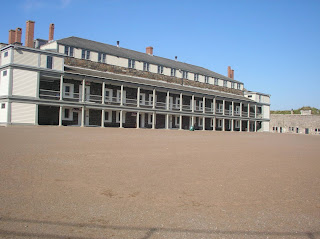Having an hour free, I revisited a place I visited often since I was quite small; Citadel Hill or Fort George. It lies smack in the middle of downtown Halifax.
There has been a fort on citadel Hill since 1749 but the Fort as it is wasn't completed until 1856.
This is the slope going up to the fort.
Here it is a little closer. Does it look like you can get to the fort from here?
Nope. Its quite a drop and this is the reason these style of forts were extremely tough to take and this one was never taken or even attacked.
This is the passageway into the fort and back then was the only way in. There are little cubbyholes for riflemen to get some cover in the sides of the passageway.
This is a view once you go through the passageway to the left. Note the ramp going to the upper ramparts and the magazine to the left of it.
This is the view to the right of the passageway. As you can see its huge inside the fort. The army museum is in the second floor of the wood and stone structure.
Here is a view back out of the fort. The uniforms the rein-actors wear are very good. There are people dressed in all different branches of the military worn during the 1800's.
Here are some learning drill.
This is a model of the smaller fort that was originally built here and were all over North America where the British needed defense networks. I think it would make a good model building for tabletop gaming.
In the army museum they also have lots of uniforms, medals, memorabilia and weapons from the entire period that the British and Canadian army existed in Canada.
This is a Vickers machine gun, used during WW1 and as well WW2. My grandfather, part of the North Shore regiment, was in charge of a unit that used these, the Cameron Highlanders.
Here is a view of the ramp I used to walk into the fort. You can get here from inside the fort. This way, if the enemy managed to use ladders and such to get into this area, soldiers from inside the fort could engage them and get back inside before they were approached, then they would be engaged on the other side. Of course, this would be happening while being fired upon from above.
This is also in the same area pointed the other way. The structure center left is a standalone building that would have their own soldiers and cannon. It would also be self sufficient for a time yet still able to be resupplied from behind it. You can see the stairs to it center right that lead to the main fort on the right.
Now we're back in the main fort looking at the magazine wall. I like the sentry box and think it would make a good little modeling project.
Here is an example of barracks for the men. Simple, effective and promoted unity as a unit would eat, sleep, train and work together.
This is a view of the mouth of Halifax harbour from one of the cannon slots. They had a commanding view to engage enemy ships entering the harbour. You can see a fortified island center left that also aided in defense of the harbour. This fort also had cannon all around which meant it could not be engaged by land easily, like the other fantastic fort in the Maritimes, Fortress Louisburg in Cape Breton. This fort also had a "commons" around it which was an area for animal grazing and celebrations and gatherings. This also aided in the defense of the fort because the enemy could not use the urban terrain to get to the front door of the fort.
If you want to see a google skyview of the Citadel, click here and click satellite view.
Definitely spend a full morning here, not only to avoid the crowds and heat but also to experience the short films that are shown in multiple places around the fort and to speak with the rein-actors.


















No comments:
Post a Comment